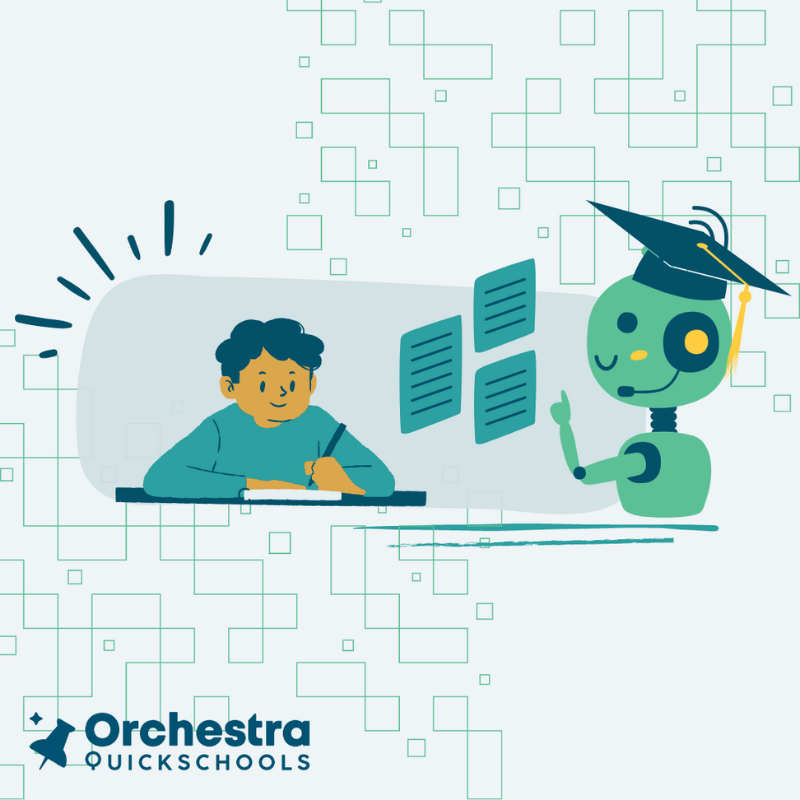Technological advancements are reshaping various aspects of our lives, and education is no exception. Incorporating Artificial Intelligence (AI) in education has emerged as a game-changer. Helping to transform traditional teaching methods and expanding the horizons of learning. Can the rise of AI in education really empower this generation of students for success?
- The Rise of AI, a game-changer for learning
- Navigating the challenges of AI
- Embracing the AI Dilemma: Debating the Rise of AI in Education
- Your Voice Matters: Weighing In on the AI Debate
The good, the bad and in the between.
The Rise of AI, a game-changer for learning
Personalized Learning
Imagine a world where your education is uniquely tailored to your needs, allowing you to learn at your own pace and focusing on areas you need the most help. This dream becomes a reality with the help of AI. AI can analyze student data to provide personalized learning experiences. It adapts instruction to individual needs, helping students to learn at their own pace. This tailored approach enhances engagement and improves learning outcomes. It’s like having a virtual private tutor by your side, guiding you through your educational journey.
Efficient Assessment and Feedback
Not only does AI make learning more personalized, but it also makes assessments a breeze. AI can automate grading and provide instant feedback to students. It saves teachers time, allowing them to focus on instructional activities. Students also receive timely feedback. No more waiting anxiously for teachers to grade tests or assignments. Students can immediately see which areas they excel in and what needs improvement.
This empowers students to take charge of their own learning, become active participants and foster a sense of autonomy. With AI as a supportive companion, students can explore their interests, dive deeper into subjects that appeals to them, and develop a genuine passion for knowledge.
Data-Driven Insights
Contrary to popular belief, AI does not only help students. It also serves as a huge help to teachers. Being able to analyze vast amounts of data, AI can provide valuable insights into student performance and engagement. Teachers can identify trends, patterns, and areas where students need additional support. This enables teachers to make informed decisions about their teaching strategies and ensuring students receive the best possible education, tailored to their unique needs.
Navigating the challenges of AI
Equity and accessibility
As with any transformative innovation, AI integration in education raises important considerations. While AI offers remarkable learning opportunities, not all students have access to technology and the internet equally. Access to technology and reliable internet connectivity can create disparities among students. Bridging this gap is imperative to ensure that all students can benefit from AI-powered resources and experiences.
Fear of overreliance on technology
It is vital to remember that AI is not meant to replace human educators but rather only to enhance the learning experience. AI tools, such as chatbots or automated grading systems are designed to provide support and augment the educational process. Preserving the role of human educators and the important social interactions they foster is crucial for holistic learning. Striking a balance between AI assistance and human guidance ensures a comprehensive and well-rounded educational experience.
Embracing the AI Dilemma: Debating the Rise of AI in Education
Now the question is, should schools ban the use of AI in education? The role of AI in education can be a heated debate with neverending concerns on the quality and integrity of education now with the rise of AI.
But let’s take a step back and reflect on past technological advancements that have been incorporated into education and whether it is an issue today. For instance, spell-checks on Microsoft Word and Google Docs. The same question arises, is that not considered cheating? Just because spell checks help us with our writing, does not mean that we are not learning. Most of the time, it’s just a mistake or a “typo” and not because we do not know the correct spelling (ever had the problem where your fingers type faster than you think or you just have butterfingers?). Instead of having to take out our dictionaries, spell checks help make our lives easier. It is just a matter of convenience.
Unfortunately (or fortunately), there is no right or wrong answer. It’s either we take the opportunity to utilize the digital tools that are available to us, or we don’t. If we view any digital tool as a “cheating tool” then that is all it will be. However, rather than perceiving AI as a threat or a means of cheating, we should view it as an opportunity to embrace technology and innovation in education.
By integrating AI responsibly, educators can create a learning environment that harnesses its benefits. For example, if we use AI to increase efficiency and productivity, it can become a powerful tool that enhances the learning experience. Embracing AI in education opens up a world of possibilities. Blocking its use could mean missing out on the potential benefits it offers.
By establishing ethical guidelines and upholding the culture of academic integrity, we can ensure that AI is used responsibly, empowering students to thrive in the digital age while upholding the principles of learning and academic integrity.
Your Voice Matters: Weighing In on the AI Debate
We would love to know your thoughts about this subject, especially from fellow educators. Were there points that we missed? Is there more elaboration on some of the arguments? Should educators see AI as a friend or a foe? Let us know your thoughts about the rise in AI in education in the comments below and sign up for our newsletter to follow this AI journey. It is only just the beginning.





4 thoughts on “Empowering Students for Success with the Rise of AI in Education”